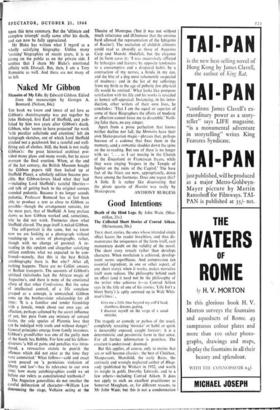Naked Mr Gibbon
Memoirs of My Life. By Edward Gibbon. Edited from the manuscripts by Georges A. Bonnard. (Nelson, 84s.) THE book we know and (most of us) love as Gibbon's Autobiography was put together by John Holroyd, first Earl of Sheffield, and pub- lished by him two years after Gibbon's death. Gibbon, who 'seems to have projected' the work 'with peculiar solicitude and attention,' left six holograph sketches, out of which Lord Sheffield stitched not a patchwork but a tasteful and well- fitting suit of clothes. Still, the book is not really Gibbon's: the great historical architect pro- vided many plans and many words, but he never oversaw the final erection. When, at -the end of the last century, the British Museum bought the Gibbon papers (till then locked up at Sheffield Place), a scholarly edition became pos- sible. But Gibbon-lovers liked what they had —including Lord Sheffield's tasteful liberties— and talk of getting back to the original sources sounded pedantic. Because it no longer sounds pedantic, Professor Bonnard has at last been able to produce a text as close to Gibbon as possible—though the arrangement remains, for the most part, that of Sheffield. A long preface shows us how Gibbon worked and, sometimes, why he did not work. Footnotes show what Sheffield altered. The page itself is naked Gibbon.
The self-portrait is the same, but we know now we are looking at a photograph without touching-up (a series of photographs, rather, though with no change of posture). A re- reading in this opulent and altogether satisfying edition confirms what we expected to be con- firmed—namely, that this is the best British autobiography there is. But why? After all, nothing happens. There are no Cellini amours or Berlioz transports. The accounts of Gibbon's spiritual vicissitudes lack the African magic of Augustine's, and there is none of the emotional allure of that other Confessions. But the sense of intellectual control, of a life somehow grasped as a concept, is unmatched. Gibbon sums up the brother-sister relationship for all time: 'It is a familiar and tender friendship with a female, much about our own age; an affection, perhaps softened by the secret influence of sex, but pure from any mixture of sensual desire, the sole species of Platonic love that can be indulged with truth and without danger.' General principles emerge from family instances. Gibbon's grandfather was one of the guilty men of the South Sea Bubble. For him and his fellow- directors 'a bill of pains and penalties was intro- duced, a retroactive statute to punish the offences which did not exist at the time they were committed.' What follows—cold and exact scorn poured on 'a pernicious violation of liberty and law'—has its relevance to our own time; how many autobiographies could we set before our rulers as constitutional textbooks?
The Augustan generalities do not smother the careful delineation of character—William Law denntmcing the stage,. Voltaire acting .at: the Theatre of Monrepos Out it was not without much reluctance and ill-humour that the envious bard allowed the representation of the Iphigenie of Racine'). The recitation of childish ailments could read as absurdly as those of Augustus Carp and Munshi Abdullah, but the elegance of its form saves it: 'I was successively afflicted by lethargies and feavers; by opposite tendencies to a consumptive and a dropsical habit; by a contraction of my nerves, a fistula in my eye, and the bite of a dog most vehemently suspected of madness : and in the list of my sufferings from my birth to the age of puberty few physical ills would be omitted.' What looks like pompous satisfaction with his life and his works is revealed as honest self-appraisal. Instancing, in his intro- duction, other writers of their own lives, he concludes : `That I am the equal or superior of some of these Biographers the efforts of modesty or affection cannot force me to dissemble.' Noth- ing false there, no coy simper.
Apart from a prose perfection that knows neither decline nor fall, the Memoirs have their own Shakespearian magic—phrases that, perhaps because of a cadence that fixes them in the memory, send a romantic shudder down the spine on the re-reading. But one of these is no longer with us: `. . . as I sat musing in the Church of the Zoccolanti or Franciscan fryars, while they were singing Vespers in the Temple of Jupiter on the ruins of the Capitol.' The bare feet of the friars are now, appropriately, down there among the footnotes. Does one regret this? A little. It is rather like discovering that the pirate quarto of Hamlet was really by
Shakespeare. ANTHONY BURGESS


































 Previous page
Previous page